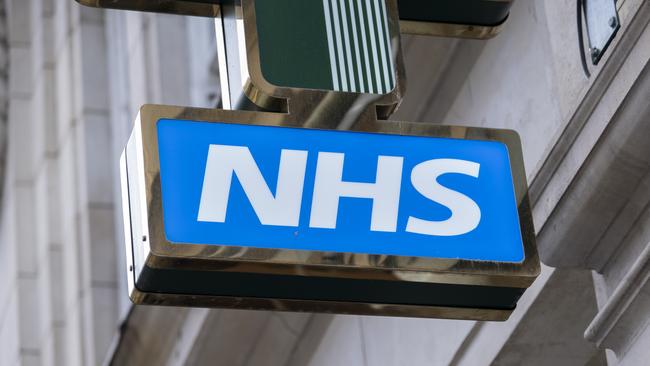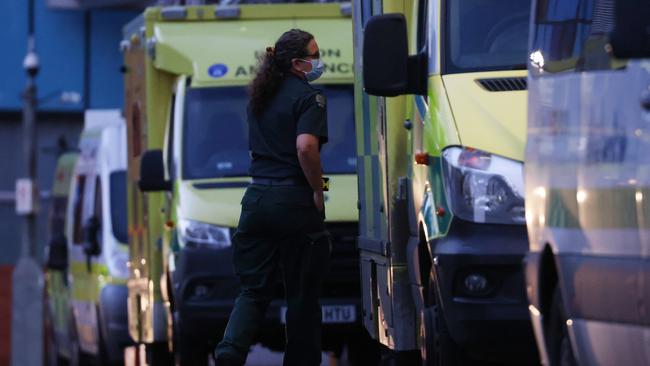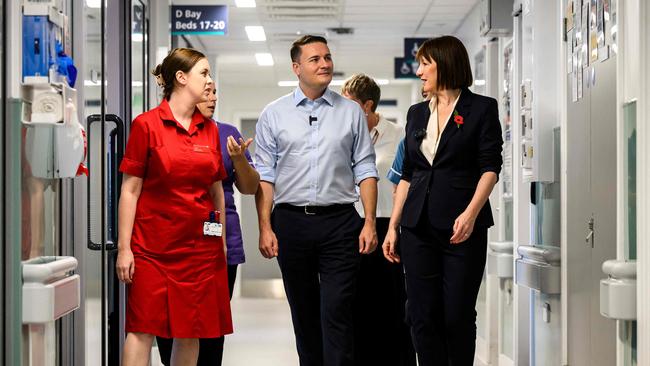The doctor won’t see you now: my battle against a sick system
Almost 1.3m people see a GP under Britain’s NHS every day. But to do so they have to battle against sclerotic bureaucracy.

The three phones are set, calling a local number 20 seconds on rolling rotation. It is 7.59am precisely. With the fervour of trying to buy a Bruce Springsteen ticket, I keep pressing the phones. If I am lucky I may get through by around 8.06am. If not, I try for another four minutes or so and then give up, to try again tomorrow.
The prize at the end is not some longed-for evening night out, but a chance to get through to the doctor’s receptionist. The doctor’s office is just down the road but I am not allowed to pop in. And I can’t just change doctors from the one I have been allocated.
Just eight slots are available each day and the phone-call lucky-dip is just one step before I can see a doctor. This is the National Health Service in 2024, the monolithic public health system in Great Britain which costs $2bn every 2.4 days and which is essentially an exercise in patient perseverance and chance.
I had already filled in the online form, outsourced to some big company which requires ticking various boxes and adding explanatory notes to get to this point. At the end of the form-filling I was told by the AI algorithm, simply, and as expected, to ring my local practice.

On this day I get through. With no consideration for patient confidentiality I have to detail, in great length, exactly what my symptoms are to an anonymous person at the end of the line. The receptionist, someone in their early 20s on low pay and with little medical experience gets to assess this, as well as the desperation in my voice. I have learned to be very firm and insist, in my fiercest no nonsense tone, that I MUST see the doctor.
At this point, I then get put on a list for a medical practitioner to ring me. It might be today, or tomorrow. The receptionist assures me that if no one rings in 96 hours then I can ring back.
To be fair I have never had to wait the 96 hours, but I have had to wait the two days, phone fully charged, volume up loud to ensure I don’t miss this important call. All the while feeling rotten and anxious.
After some time the doctor rings me and I repeat my condition, symptoms and the reason for the call. This is the third time I have said all of this and so I can be brief and succinct.
He says come in and see me. It is late in the day and the week has been already booked up: the earliest slot is Friday. It is now Tuesday.
Once I see the doctor he actually scolds me: I should have gone to the hospital, and he orders blood tests and scans. I hadn’t realised until now that I was actually quite ill. Neither had he until this in-person visit. Who would have thought?
Where once I could just pop into next door to have the bloods, it is now a two-week wait for an appointment time to see the nurse. This timeslot, booked online, would be eventually cancelled – the nurse was off – and another slot found a further few days down the track.
But my appointment time for the all-important scans will arrive via a letter within a promised six-week window, the doctor says.
I raise my eyebrow at this and he marks it down as very urgent.
Can I book online? No. Can I have the number of the scan department? No, it turns out I could be sent to any of the hospitals around London and I have to wait for someone to allocate it. While the promise is that the letter will arrive within a fortnight, the scan itself may be in two months’ time. He tells me to rest and if I feel poorly to go straight to Accident and Emergency. His tone of voice indicates some concern.
I leave his room fighting back tears, pull out my phone and book and pay a large sum of money for private scans, vaguely researched in 30 seconds using Google.
The scans were done that early evening.

I then repeat the triple phone booking procedure in order to see the doctor once more after all of the tests have been completed. He was unconcerned that some of the tests had been done privately. Even fast-tracking the scans, the time from first awareness to diagnosis was seven weeks. Thankfully, all is well.
A recent NHS survey of more than 100,000 people shows that my experience is not isolated. The survey showed that only three-quarters of patients can get through to a doctor’s receptionist on the same day.
Of those that got through, less than half – 42 per cent – were offered face-to-face appointments. Only a third were booked for that day. Forty-four per cent were booked within two weeks.
An independent charity, the Kings Fund – set up in 1897 by King Edward VII — said on an average day in the NHS, nearly 1.3 million people attend a GP appointment, more than 275,000 will attend an outpatient appointment, nearly 35,000 will call the emergency number 999, more than 44,000 people will attend the accident and emergency section of a hospital, with 28 per cent of them admitted and around 650 patients will go into critical care.
The system is severely strained and successive governments have continued to throw more money at it.
The budget for the NHS in 2024-25 is £192bn or nearly $380bn. In 2022 the OECD said the UK spent 11.3 per cent of GDP on health, compared to Australia’s 9.6 per cent of GDP.
Yet, increasingly, treatment on the NHS is delayed because of staff shortages and there are common complaints about outdated equipment.
Data from the Office for National Statistics has revealed that a third of cancer patients are waiting longer than the 62-day standard to begin accessing treatment.
Then when they do arrive at the cancer treatment centre, where nearly half of them are experiencing delays in providing chemotherapy and radiotherapy, many find their appointment days are pushed back even further.
Despite public dissatisfaction and frustration with the system, the NHS is politically untouchable. Apart from having 1.34m full-time equivalent staff in England and being one of the world’s largest employers, the concept of free health care – funded from general taxation – even while creaking at the seams, is considered the backbone of British life.




To join the conversation, please log in. Don't have an account? Register
Join the conversation, you are commenting as Logout